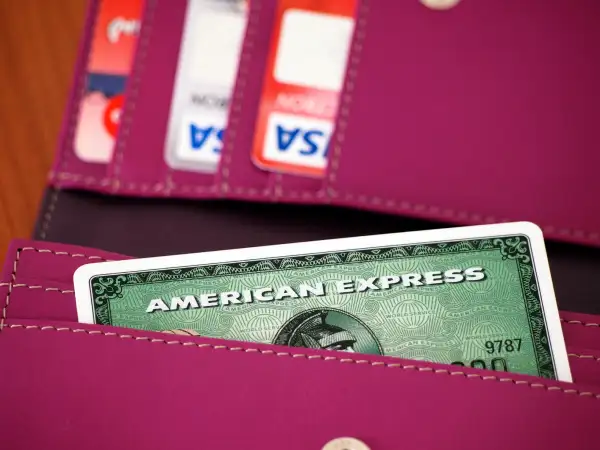Why American Express Users Should Be Worried About Their Rewards

AmEx cardholders, beware. A new court decision may have put your rewards in danger.
On Thursday, a federal judge ruled the credit card company had violated antitrust laws by preventing merchants from encouraging customers to use other cards. That may not sound like a big deal, but it could cost American Express billions of dollars over time and seriously curtail the services it can afford to provide its customers.
What's behind all of this? It comes down to something called interchange fees. For the last four years, American Express has been fighting with the Justice Department over how the company treats its merchants. Store owners must pay credit card companies an interchange fee—generally between 2% and 3% of an individual purchase—every time a customer swipes at checkout. The credit card companies take much of that money as profit, while also giving some portion of it back to cardholders in the form of cash back, airline miles, or other rewards.
American Express has historically charged higher interchange fees than Visa and MasterCard, making it theoretically able to give better rewards. That's great for AmEx users, but not so great for store owners who would like to encourage their customers to pay with a different, less expensive card. Costco recently ended an exclusive relationship with AmEx due to cost concerns that likely included interchange fees.
American Express has thus far prevented this kind of revolt by specifically forbidding their merchants from giving cheaper cards special treatment, such as discounts, or even telling customers American Express is bad for their businesses. Thursday's ruling says this kind of contract violates the law.
If the judge's decision holds, Amex will likely be forced to charge lower interchange fees or risk merchants actively steering customers toward competitors. Less money for AmEx could in turn mean worse benefits for its users or higher membership fees to make up for interchange losses.
"Every time you start taking away from credit card companies they're going to make it elsewhere," says James Wester, a global research director at IDC specializing in payments. "If it’s not in higher [membership] fees, it may be in lower benefits or membership rewards." He notes that the so-called "Durbin Amendment," which limited debit card swipe fees, ultimately led to the demise of debit card benefits.
Some have argued lowering AmEx's fees would be a boon for the general public, if not for American Express users themselves, because merchants would pass that savings on to the consumer through lower prices and/or discounts for those using cheaper cards. But the economics of that position don't seem to hold up.
The difference between an Amex swipe fee and a Visa swipe fee is tiny, meaning any noticeable discount for users of low-fee cards would probably eat away any money the merchant would be saving. "It wouldn't make sense to give 10% off a purchase if you're saving 1% of an interchange fee," says Matt Schultz, senior industry analyst at CreditCards.com.
Lower fees also don't seem very likely to bring down in-store prices. "Retailers are seeing extra costs of their own these days with implementation with EMV terminals and extra technology for combating fraud," adds Schultz. "Whether that money they would save on the interchange fees would end up coming back to the consumer, it’s hard to say."
In the end, the ruling may simply transfer wealth from AmEx and its members to merchants and store owners with little impact on everyone else.
That said, don't burn your American Express card just yet. While Judge Nicholas Garaufis did rule against AmEx, he didn't impose his own solution. Instead, he essentially told the company and the Justice Department to figure out their own fix and come back to him later. It's possible both parties will come to a compromise that doesn't end up seriously reducing the company's interchange fees.
AmEx has also said it will appeal the judge's decision, meaning a true resolution to the whole affair is still far in the distance. "It’s certainly appealable,"said Steven Cernak, an antitrust lawyer at the law firm Schiff Hardin, who thinks another trial would take a year at minimum. "My guess is they will take another shot to convince a panel of three judges this judge got it wrong."
